Yes, if you create two strings like:
String a = "Hello";
String b = "Hello";
They will be the exact same object. You can test it yourself by doing
System.out.println(a == b);
If they are the same object, then their internal reference to the character array will be exactly the same.
Now, if you did String c = "Hell" + "o";, it would not have the same reference since it would have been (internally) built using StringBuilder.
There is a lot of good information here.
The relevant sections has (Note: The following is copied from that web site):
As mentioned, there are two ways to construct a string: implicit construction by assigning a String literal or explicitly creating a String object via the new operator and constructor. For example,
String s1 = "Hello"; // String literal
String s2 = "Hello"; // String literal
String s3 = s1; // same reference
String s4 = new String("Hello"); // String object
String s5 = new String("Hello"); // String object

Java has designed a special mechanism for keeping the String literals - in a so-called string common pool. If two String literals have the same contents, they will share the same storage locations inside the common pool. This approach is adopted to conserve storage for frequently-used strings. On the other hands, String object created via the new operator are kept in the heap. Each String object in the heap has its own storage just like any other object. There is no sharing of storage in heap even if two String objects have the same contents.
You can use the method equals() of the String class to compare the contents of two Strings. You can use the relational equality operator '==' to compare the references (or pointers) of two objects. Study the following codes:
s1 == s1; // true, same pointer
s1 == s2; // true, s1 and s1 share storage in common pool
s1 == s3; // true, s3 is assigned same pointer as s1
s1.equals(s3); // true, same contents
s1 == s4; // false, different pointers
s1.equals(s4); // true, same contents
s4 == s5; // false, different pointers in heap
s4.equals(s5); // true, same contents
Edit to add: Run this SSCE to test reference equality between two constant strings in to different classes:
class T {
String string = "Hello";
public static void main(String args[]) {
T t = new T();
T2 t2 = new T2();
System.out.println(t.string == t2.string);
}
}
class T2 {
String string = "Hello";
}
prints out true.
